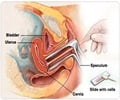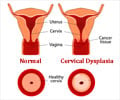Identifying metabolic fingerprints could develop future diagnostics, interventions or therapies for cervical cancer as it can help distinguish HPV-infected patients, women with pre-cancerous conditions and cervical cancer from women who were HPV negative.

‘Metabolic fingerprinting has the potential for the development of future diagnostics, preventatives or treatments for cervical cancer to enhance women's health outcomes.’
Read More..




This is the first report on cervicovaginal metabolomes in HPV-associated pre-cancerous cervical conditions and cancer that demonstrates the predictive value of metabolic fingerprinting in abnormal cell metabolism. The study identified 475 metabolites in cervicovaginal samples that changed across the progression of the disease, resulting in unique metabolic fingerprints.Read More..
The metabolome is the collection of biochemicals, or metabolites, present in cells, tissues or body fluids, whereas metabolites are the individual molecules that make up the metabolome. Levels of these metabolites often change in response to disease. Metabolomics is the comprehensive study of the metabolome that has the potential to impact science.
"This study is an example of how scientific research and breakthroughs directly impact patient care," William Cance, MD, deputy director of the UA Cancer Center said. "Dr. Herbst-Kralovetz, also a researcher at the UA Cancer Center, and her colleagues have employed novel biologic analyses to identify metabolic fingerprints that could be used to develop future diagnostics, interventions or therapies for cervical cancer."
The fingerprints identified in the study helped distinguish HPV-infected individuals, women with pre-cancerous conditions and cervical cancer from women who were HPV negative.
"Metabolic fingerprinting has the potential to be used for the development of future diagnostics, preventatives or treatments for cervical cancer to enhance women's health outcomes here in Arizona and beyond," said Dr. Herbst-Kralovetz, who also is the director of the Women's Health Microbiome Initiative at the College of Medicine-Phoenix. "Doing so could aid in reducing mortality to the fourth-leading cause of cancer in women."
Advertisement
Women diagnosed with invasive cervical cancer, compared to those who were HPV negative, were highly associated with genital inflammation and a higher vaginal pH. In pre-cancerous groups, researchers observed how microbial communities influenced amino acid and nucleotide metabolisms, which are building blocks of cells.
Advertisement
"Cervical cancer is a devastating disease, especially in rural areas and developing countries," said Jennifer Barton, Ph.D., director of the UA BIO5 Institute. "These findings could lead to a simple, rapid diagnostic test to help women get the treatment they need."
Source-Eurekalert














